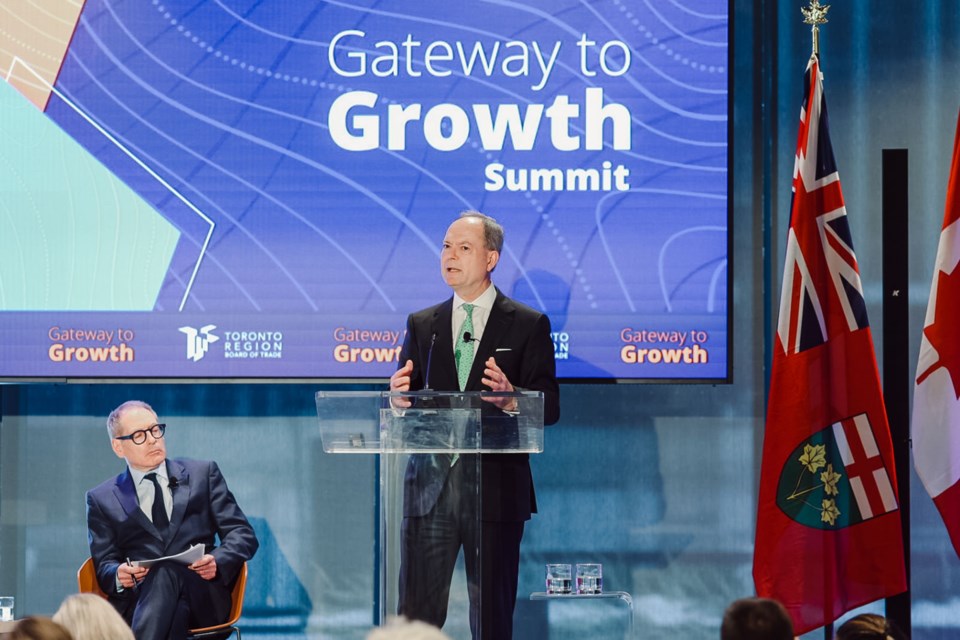EDITOR’S NOTE: This article originally appeared on The Trillium, a new Village Media website devoted exclusively to covering provincial politics at Queen’s Park.
Two-and-a-half weeks before he plans to introduce the Ford government's 2023 budget, Peter Bethlenfalvy explained in broad strokes what to expect in it to a downtown Toronto audience.
The budget will signal that Ontario "wants to be the economic engine of Canada and frankly, North America," the finance minister told attendees at the Toronto Region Board of Trade's Gateway to Growth Summit on Thursday.
The budget is also meant to prepare Ontario for "all the people that come to Ontario," the finance minister said. The federal immigration department said Canada had 431,645 new permanent residents last year, with more than half of them settling in Ontario, according to Bethlenfalvy. The federal government plans to admit more permanent residents each year from 2023 to 2025.
"So, we've got to think ahead about the types of infrastructure, not just for an existing population.... Where are we going to put 250,000 to 300,000 (more people) a year?" Bethlenfalvy said.
"Talk about population pressures now — gridlock, number of schools, health care... number of hospitals, subways, how are we going to move people, how are we going to get goods to market. You have to have a vision, so in the budget we'll talk more about what we're doing to get it done, because that's our top priority," he said.
Similar to previous remarks, Bethlenfalvy said "the thing that keeps me up (at night) more than anything" is Ontario's growing labour gap and the challenge of filling it. Specifically, he talked about "the skilled trades, health-care educators, early educators, (and) health-care professionals" as jobs that Ontario needs to fill.
The Ontario government expects to learn from the federal government by the end of March how many immigrants it can bring in this year by way of the Ontario Immigrant Nominee Program (OINP). Last year, Ontario admitted 9,750 nominees through the OINP, which is the main immigration program it uses for directly filling gaps in the labour force with new migrants.
Budget day should be about advancing that agenda, Bethlenfalvy said. "How are we focused on labour? How are we focused on getting things done in infrastructure? How are we focused on attracting that investment to Ontario?"
The finance minister also mentioned specifically the government's ongoing efforts to attract "advanced manufacturing" to Ontario, including building electric vehicles, advancing its critical minerals strategy, and working on "advanced technology in life sciences."
"Those are three of our core pillars of building this economy," he added.
The 2023 budget will be the third Bethlenfalvy will introduce as finance minister. He took over the portfolio on New Year's Eve in 2020 after former finance minister Rod Phillips stepped down after vacationing in St. Barts while officials were advising against non-essential travel.
Governments are supposed to keep a lid on the specifics — like the exact spending figures — included in any annual budget.
Putting together the budget is the finance minister's primary responsibility. While the budget cycle is year-round, the minister and his staff tend to turn their focus to the upcoming year's budget right after releasing a fall economic statement — which some in politics, including Bethlenfalvy, refer to as a "mini-budget."
Formal pre-budget consultations led by the finance minister tend to begin for the next year's budget around the end of the previous calendar year.
Leading up to the budget's release, the other members of cabinet tend to prepare wish lists of what they'd like it to include before presenting them to the finance minister.
The Ford government created fines against the premier and finance minister for failing to introduce any year's budget after the start of its fiscal year, which is on April 1. However, the government also changed that law to allow itself to introduce its 2022 budget a month late last year — free of penalty — to allow itself to introduce its budget just days before last year's election campaign. After not passing its 2022 budget before the election, the PCs repurposed it as their platform in the campaign and then reintroduced and passed what was effectively a carbon copy after the legislature resumed following the June 2 vote.
Bethlenfalvy has promised to release the Ontario government's 2023 budget on Thursday, March 23.
